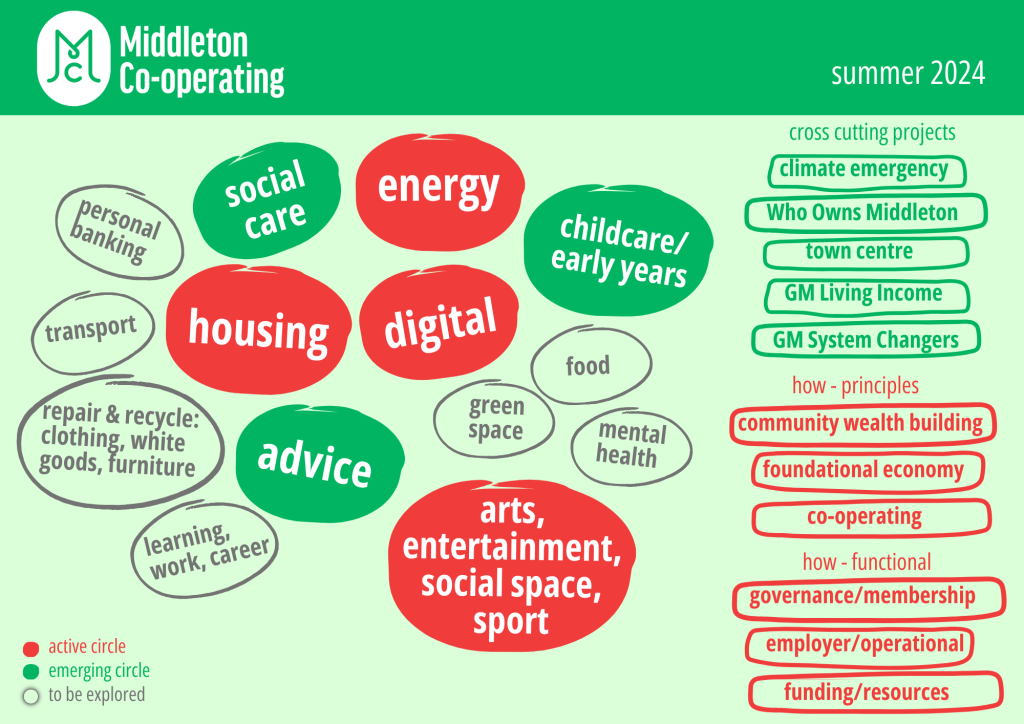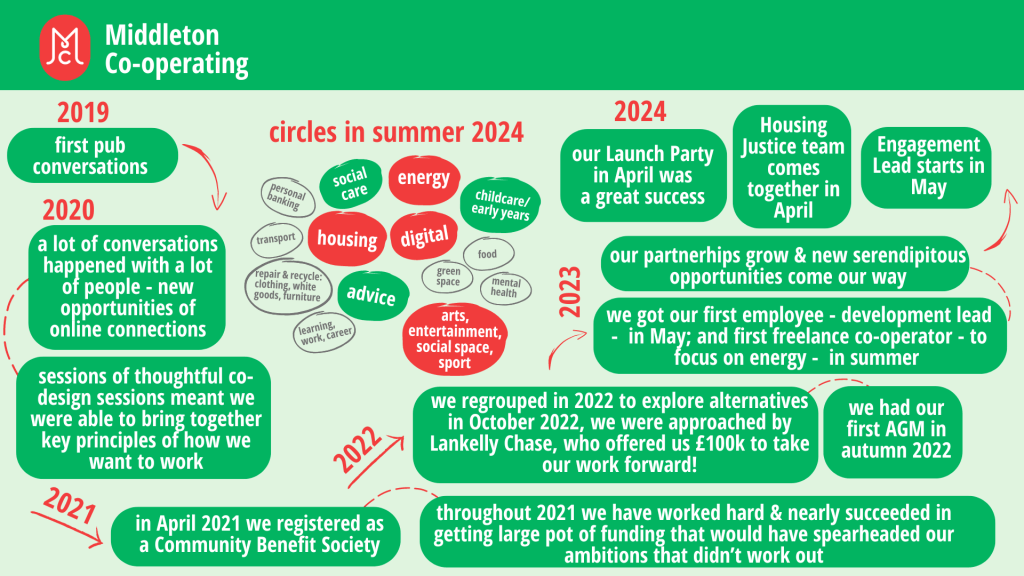A town in Rochdale, the borough that gave birth to the co-operative movement, is embarking on a “crazily ambitious” community-led mission to become Greater Manchester’s first co-op town.
Middleton Co-operating aims to make a positive difference to the things that have the biggest impact on people’s day-to-day lives, through co-operation, for the benefit of everyone in its M24 postcode.
“There’s quite an identity crisis in Middleton,” says Kallum Nolan, Middleton Co-operating founder and lifelong Middletonian.
“It’s a Manchester postcode, 0161 phone code, accent like mine, but it’s under the power of Rochdale Council, and that’s created a lot of tension over the years. … That’s the feeling of Middletonians, really, that it kind of gets left behind by Rochdale.”
In 2018, Nolan was elected as a local councillor on a ticket of trying to rectify these issues, including Middleton’s “too many empty buildings, too many empty shops, too many beautiful historical buildings left to ruin”.
Related: A co-operative answer to the UK’s housing crisis?
One such building is the 100-year-old Warwick Mill – “Five stories, 250,000 square feet of nothingness owned by a Chinese conglomerate that has been sitting on it for years” – that looms over the town (main picture).
Just before the pandemic, Nolan was part of a residents’ action group that looked to develop a bold vision for the mill as a community-owned space, with community wealth building at its heart. The council was on board, but a planning application submitted by the building’s owners has stalled any further progress of the project.

“That was during lockdown, and nothing’s been done since,” explains Nolan. “But, during that journey and our talks with the Greater Manchester Combined Authority and local authorities, they said ‘look, you’ve got a brilliant idea, but why contain it to one building? Why not put that across Middleton?’ “Then we thought about trying to make Middleton Greater Manchester’s first co-op town – and the idea of Middleton Co-operating was born.”
Middleton Co-operating’s first project was Middleton Community Power, a group of local residents and activists coming together to explore setting up community-owned energy provision, with an initial focus on solar power generation and retro-fitting buildings.
Fast forward to the present day, and Middleton Co-operating is supporting a host of local initiatives, on issues such as energy, housing, digital and arts, and working with a range of partners with shared values to “make good things happen”.
In 2022, Middleton Co-operating was awarded £100,000 by funding body Lankelly Chase, enabling it to hire its first member of staff, development lead Veronika Susedkova.
“It’s lots of meeting people and getting the right people in,” says Susedkova. “We’re no experts, and so we need people to do this with us. We don’t always know what we’re doing. It’s sort of working it out as we go along.”
As much as Middleton Co-operating embraces flexibility and fluidity in its work, Susedkova acknowledges there are some essential elements that work as “scaffolding” to keep the organisation on track. This includes community wealth building, an approach to developing localised economies that has gained traction in the UK in recent years.

Middleton Co-operating is also keen to point out that, to them, the term ‘wealth’ goes beyond material resources and refers to the wellbeing of the whole community.
While some examples (notably, the Preston model) are propelled by local authorities wanting to change the way they work and where they spend their money, Middleton Co-operating places less emphasis on councils and procurement, and more on grassroots groups working together and partnering with different types of anchor organisations, of which local councils may or may not be one.
The foundational economy is another key part of Middleton Co-operating’s work. Made up of all of the things people rely on in day-to-day life, the concept of the foundational economy informs the areas of work Middleton Co-operating choose to focus on.
Related: Study published in Lancet finds health and wellbeing benefits from Preston model
Through a co-design process, the organisation identified 14 areas that relate to the town’s foundational economy, with each of these areas forming a circle of work. Of these 14 circles, energy, housing, digital and arts contain active projects, while social care, advice and childcare contain emerging projects, and the rest (personal banking, transport, repair and recycling, learning and work, green space, food and mental health) are yet to be explored.
Currently, says Susedkova, “many of these basic things we have in our lives are owned and run by people who are not here, therefore they care less”.
This conversation around ownership is one of the ways in, when trying to explain what the organisation does to people who are new to the idea.
Reflecting on his own experience, Nolan says: “Obviously we know about co-operation and the Rochdale Pioneers, but when we were co-designing Middleton Co-operating, I’ll be honest, I felt like the thick working-class lad who was like, ‘we still can’t explain what this means to people on the street’.”
The challenge, he adds, was how to get this to idea resonate with working-class people in Middleton, who may not know what a co-op is. “If someone’s skint and they’re running a small business, are we going to go and ask them to turn that into a co-op?”
Middleton Co-operating is committed to the principles of the co-operative movement, but when it comes to its projects and partners, the organisation is about co-operation “in the simplest sense of the word”.
“It’s not just about creating more co-ops to do things, because the governance structure is just one of the elements of it,” says Nolan.
Susedkova gives the example of a piece of work Middleton Co-operating is doing at the moment, bringing together social housing tenants with Greater Manchester Tenants Union and other partners to get residents necessary repairs on their properties. Alongside this practical and immediate action, the project also sows the seeds for a potential longer-term solutions, such as community-owned housing, when and if people are ready.
Middleton Co-operating is holding its Annual General Party (Susedkova: “why have a meeting, when you can have a party?”) this month, where members will discuss how to make the organisation truly member-led.
“Member engagement, and actual, honest participation and leadership within co-ops, is the biggest thing ever,” says Susedkova. “If you can get an engaged membership who actually takes part, who actually really cares… then that’s like the holy grail of making it work, and making it sustainable.”
As a multi-stakeholder co-op, Middleton Co-operating has a number of different types of membership, but its current membership structure may change based on the collective decisions of those currently involved. What seems clear however, is the work that has been done since the idea of Middleton Co-operating was born, has laid fertile ground for the continued growth of a strong network of people to make Middleton a truly co-operative town.

